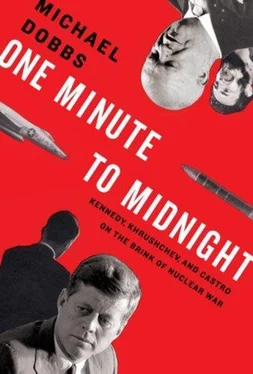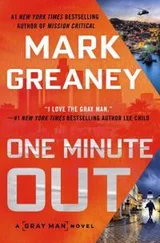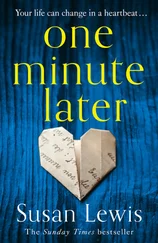It is categorically confirmed that it is forbidden to use nuclear weapons from the missiles, FKRs, and Lunas, without approval from Moscow. Confirm receipt.
One big problem remained: selling a Cuba-Turkey deal to Castro. The proud and hypersensitive Fidel was likely to react angrily to any negotiations behind his back that involved removing Soviet missiles from Cuba, particularly if he heard about the proposal first on the radio. Khrushchev entrusted the job of calming Castro down to Alekseev. The ambassador was instructed to depict Khrushchev’s message to Kennedy as a shrewd attempt to forestall the threatened U.S. invasion of Cuba. The Americans “know very well that they would be branded as aggressors if they staged an intervention under the present circumstances. They would be shamed before the entire world as enemies of peace who did not hesitate to copy the worst examples of Hitlerite barbarity.”
As Khrushchev was dictating his message to Kennedy, thousands of jeering Muscovites were protesting in the street outside the U.S. Embassy. They waved banners with officially approved slogans like “Shame on the Yankee aggressors!” “Away with the Blockade!” and “Cuba yes, Yankee no!” Some protesters even got on top of stalled trolleybuses along the Sadovoe ring road to shake their fists at the embassy and hurl stones and ink bottles, shattering a few windows.
“Who gives you the right to stop ships on the high seas?” a demonstrator asked an American reporter who was circulating in the crowd. “Why don’t you just leave Cuba alone?” A World War II veteran suggested that both sides simply give up all their military bases “and we’ll be friends as we were in the war.” A woman with a drawn face complained that Americans did not understand war because their country had never been invaded. “If you had experienced war the way we did, you would not always threaten us with war,” she argued.
Like all such “spontaneous” demonstrations in Moscow, the protest was a well-organized affair. A U.S. diplomat noted that truckloads of schoolchildren were unloaded in a nearby street and handed signs denouncing colonialism and imperialism. Hundreds of troops moved into side streets near the embassy to make sure that the demonstration did not get out of hand. The protesters disbanded promptly on an order from the police after exactly four hours, and water-spraying trucks immediately cleaned the road in front of the embassy.
Prior to Castro’s rise to power, most Russians would have had trouble finding Cuba on a map. In less than five years, the country had been transformed in the minds of the Soviet public from a faraway Caribbean island to the front line of the Cold War. Soviet propagandists referred to Cuba as “the island of freedom.” Newspapers carried glowing articles about the social revolution under way in Cuba and the evil imperialists who were trying to restore the corrupt Batista regime. Portraits of Castro and Che Guevara hung in millions of homes. Russians who did not speak a word of Spanish knew the meaning of “ Patria o muerte, ” just as their parents had thrilled to the phrase “ No pasaran ” during the Spanish Civil War.
Castro’s revolution captured the imagination of many Russians because it reminded them of their own revolution before it became sclerotic. Cuba, in the words of a Soviet intellectual, was a “training ground on which we could replay our own past.” Castro and his “bearded ones” were more attractive leaders than the elderly bureaucrats who looked down at the Soviet masses from the portraits on Red Square. There was a delicious irony to the official glorification of long-haired revolutionaries like Che Guevara at a time when Soviet officials looked askance at young people with long hair. In Cuba, everything was reversed. The higher the official, the longer the beard. Ordinary Russians were also impressed by Castro’s habit of delivering six-hour speeches without any notes. In the Soviet Union, appearances by top officials were usually carefully scripted.
Soviet propagandists attempted to tap into the romanticism of the Cuban revolution while channeling it in constructive directions. Castro’s exploits, and his defiance of the Yankees, were celebrated in the official media. Most Soviets knew the words to “ Kuba, lyubov’ moya” (“Cuba, my love”), a song glorifying los barbudos set to martial music and Caribbean drum rolls:
Kuba, lyubov’ moya.
Island of purple dawn
The song flies over the ringing planet
Kuba, lyubov’ moya.
Do you hear the firm step?
The barbudos are marching
The sky is a fiery banner
Do you hear the firm step?
The popular admiration for Cuba was tinged with wariness and skepticism, however. Decades of propaganda had left ordinary Russians suspicious of anything they read in the newspapers. American exchange students at Moscow State University were “amused, disturbed and flabbergasted” at the nonchalance displayed by their Russian friends about the threat of nuclear war. Accustomed to tuning out official rants about the sins of the imperialists, Russian students reacted as if the crisis was not all that serious. At a meeting at the university, they warmly applauded a Cuban student leader who gave an emotional speech in Russian. But they paid little attention to the canned remarks of their own professors.
A small but growing number of Russians were privately questioning the cost of “fraternal assistance” to faraway places. On Saturday morning, the Soviet Defense Ministry reported to Khrushchev that the low-level grumbling had even spread to the armed forces. A sailor on a torpedo boat in the Arctic Ocean had expressed doubt that the Cuban adventure would do anything to promote Soviet “state interests.” An air force enlisted man asked, “What do we have in common with Cuba, why are we being dragged into this fight?” A soldier in an antiaircraft unit complained about a temporary halt to discharges because of the Cuban crisis.
More ominously, just four months after the bread riots in Novocherkassk brutally suppressed by Pliyev’s troops, some people were asking why it was necessary for Mother Russia “to feed everybody else.” There was a surplus of Cuban sugar in the stores, and a deficit of Russian bread. Around bare kitchen tables, sullen Soviets were singing the rousing tune of “ Kuba, lyubov’ moya” to subversive new lyrics:
Cuba, give us back our bread!
Cuba, take back your sugar!
We’re sick of your shaggy Fidel.
Cuba, go to hell!
6:00 A.M. SATURDAY, OCTOBER 27 (5:00 A.M. HAVANA)
Castro had been at the Soviet Embassy in Havana for nearly three hours, and was still having difficulty composing his letter to Khrushchev. Don Alejandro was having a hard time understanding Fidel’s “quite intricate phrases.” Eventually, he could restrain himself no longer and blurted out the obvious question:
“Do you want to say that we should deliver a nuclear first strike against the enemy?”
That was much too blunt for the Jesuit-trained Castro.
“No, I don’t want to say it directly. But under certain conditions, without waiting to experience the treachery of the imperialists and their first strike, we should be ahead of them and erase them from the face of the earth, in the event of their aggression against Cuba.”
The drafting session resumed. As the first rays of sun appeared over the capital, Castro finally dictated a version that satisfied him.
Dear Comrade Khrushchev,
Analyzing the situation and the information that is in our possession, I consider that an aggression in the next 24-72 hours is almost inevitable.
Читать дальше












